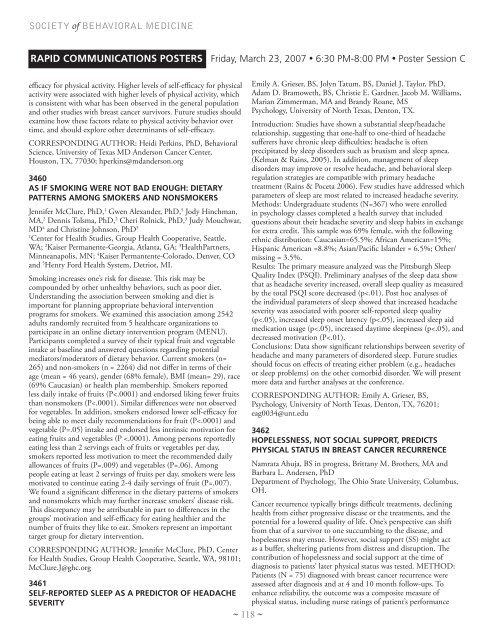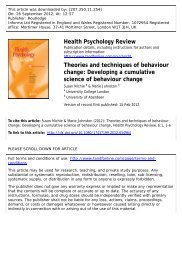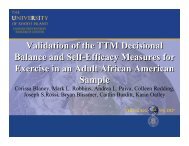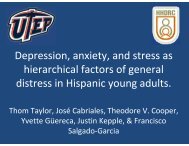2007 Final Program - Society of Behavioral Medicine
2007 Final Program - Society of Behavioral Medicine
2007 Final Program - Society of Behavioral Medicine
You also want an ePaper? Increase the reach of your titles
YUMPU automatically turns print PDFs into web optimized ePapers that Google loves.
SOCIETY <strong>of</strong> BEHAVIORAL MEDICINE<br />
Rapid Communications Posters Friday, March 23, <strong>2007</strong> • 6:30 PM-8:00 PM • Poster Session C<br />
efficacy for physical activity. Higher levels <strong>of</strong> self-efficacy for physical<br />
activity were associated with higher levels <strong>of</strong> physical activity, which<br />
is consistent with what has been observed in the general population<br />
and other studies with breast cancer survivors. Future studies should<br />
examine how these factors relate to physical activity behavior over<br />
time, and should explore other determinants <strong>of</strong> self-efficacy.<br />
CORRESPONDING AUTHOR: Heidi Perkins, PhD, <strong>Behavioral</strong><br />
Science, University <strong>of</strong> Texas MD Anderson Cancer Center,<br />
Houston, TX, 77030; hperkins@mdanderson.org<br />
3460<br />
AS IF SMOKING WERE NOT BAD ENOUGH: DIETARY<br />
PATTERNS AMONG SMOKERS AND NONSMOKERS<br />
Jennifer McClure, PhD, 1 Gwen Alexander, PhD, 5 Jody Hinchman,<br />
MA, 2 Dennis Tolsma, PhD, 2 Cheri Rolnick, PhD, 3 Judy Mouchwar,<br />
MD 4 and Christine Johnson, PhD 5<br />
1<br />
Center for Health Studies, Group Health Cooperative, Seattle,<br />
WA; 2 Kaiser Permanente-Georgia, Atlanta, GA; 3 HealthPartners,<br />
Minneanapolis, MN; 4 Kaiser Permantente-Colorado, Denver, CO<br />
and 5 Henry Ford Health System, Detriot, MI.<br />
Smoking increases one’s risk for disease. This risk may be<br />
compounded by other unhealthy behaviors, such as poor diet.<br />
Understanding the association between smoking and diet is<br />
important for planning appropriate behavioral intervention<br />
programs for smokers. We examined this association among 2542<br />
adults randomly recruited from 5 healthcare organizations to<br />
participate in an online dietary intervention program (MENU).<br />
Participants completed a survey <strong>of</strong> their typical fruit and vegetable<br />
intake at baseline and answered questions regarding potential<br />
mediators/moderators <strong>of</strong> dietary behavior. Current smokers (n=<br />
265) and non-smokers (n = 2264) did not differ in terms <strong>of</strong> their<br />
age (mean = 46 years), gender (68% female), BMI (mean= 29), race<br />
(69% Caucasian) or health plan membership. Smokers reported<br />
less daily intake <strong>of</strong> fruits (P

















